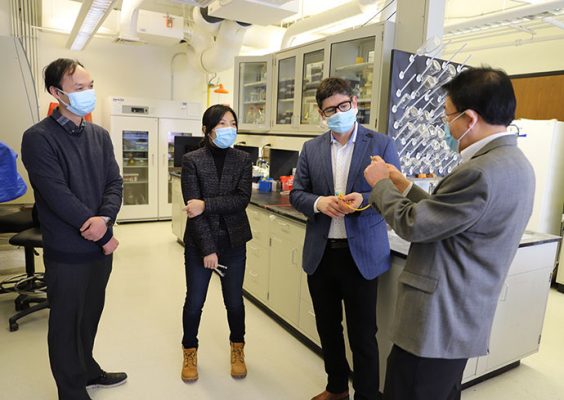For the 75 million people who require a urinary catheter, urinary tract infections are a serious concern. Catheters are prone to colonization by bacterial and fungal pathogens, which causes antibiotic-resistant infections. An infection can also lead to pH changes in the urine and block a catheter due to stone formation with potentially fatal consequences. Catheter associated urinary tract infections (CAUTIs) that are antibiotic resistant cause 13,000 deaths in the U.S. each year.
College of Engineering and Computer Science professors Dacheng Ren, Stevenson endowed professor of biomedical and chemical engineering and associate dean for research and graduate programs; Teng Zhang, assistant professor of mechanical and aerospace engineering; and Huan Gu, research assistant professor and Upstate Medical University’s Dmitriy Nikolavsky, MD, associate professor of Urology, were awarded an National Institutes of Health (NIH) R01 grant for a project aiming to engineer a new urinary catheter using smart biomaterials to reduce catheter associated complications.
 “Conventional antibiotics commonly fail to eradicate infections associated with medical devices because of the remarkable capabilities of microbes to colonize these surfaces and form drug-resistant biofilms. To solve this challenging problem, we need new strategies that can provide long-term protections. This R01 project gave us an exciting opportunity to do exactly that,” said Ren, the principal investigator of this project.
“Conventional antibiotics commonly fail to eradicate infections associated with medical devices because of the remarkable capabilities of microbes to colonize these surfaces and form drug-resistant biofilms. To solve this challenging problem, we need new strategies that can provide long-term protections. This R01 project gave us an exciting opportunity to do exactly that,” said Ren, the principal investigator of this project.
Ren’s lab has developed a new strategy designed to make catheters smarter and more resistant to infection. They successfully created micron-sized pillars with supermagnetic nanoparticles on the tip so the pillars can beat in response to an electromagnetic field generated using an insulated copper coil embedded in the catheter wall. By controlling the on and off of an electric current, they could turn the magnetic field on and off, and thus control the beating frequency and beating force of the pillars. This strategy (active topography) worked well, as these moving pillars prevented biofilm formation of multiple bacterial species by up to 99.9% compared to flat control surfaces. A prototype catheter with active topography remained clean for 30 days while the control catheters were blocked by biofilms of uropathogenic Escherichia coli within five days in an in vitro test with flow of a medium mimicking urine. Their study was published in a recent issue of Nature Communications.
Now Ren, Gu, Zhang and Nikolavsky will move forward and study the mechanism of infection control by such active topographies, and further engineer their catheter porotype for in vivo tests in this R01 project. By optimizing micron sized pillars on the catheter wall, they hope to develop a self-cleaning catheter that would be much safer for long term use.
“This strategy is inspired by the motile cilia in human airways that protects our lungs from foreign particles during respiration,” said Gu. “Thanks to the development in materials and surface engineering, we can replicate this defense strategy, make it more robust and adaptable, and apply it to address challenges such as biofilm-associated urinary tract infections in this project.”
Numerical simulations from Zhang’s lab and the collaboration with Nikolavsky in Upstate Medical University’s urology department are key components to the potentially groundbreaking work.
“Biofilms are highly complicated biological materials with active bacteria embedded in polymer networks. This poses challenges and provides opportunities to integrate mechanics modeling and simulations with well-controlled experiments to uncover the working mechanism and design principles of medical devices.”
Zhang has been collaborating with the Ren lab prior to this award and he is also a co-author of the Nature Communications paper.
If successful, the findings from this study may also help solve other infections that involve microbial biofilms, especially those associated with medical devices.
“I am very excited about this design of smart catheters, Bacterial colonization and biofilm formation on catheters, stents and other implantable devices is an enormous problem in medicine,” said Nikolavsky. “Creating such smart surfaces on catheters that would actively expel pathogens, could potentially prevent bacterial colonization, catheter-associated urinary tract infections and may save patients with chronic catheters from bladder stone formation and recurrent catheter encrustation and clogging. I expect this will improve medical care and have positive effect on quality of life for many patients and prevent some of the common urological emergencies.”

